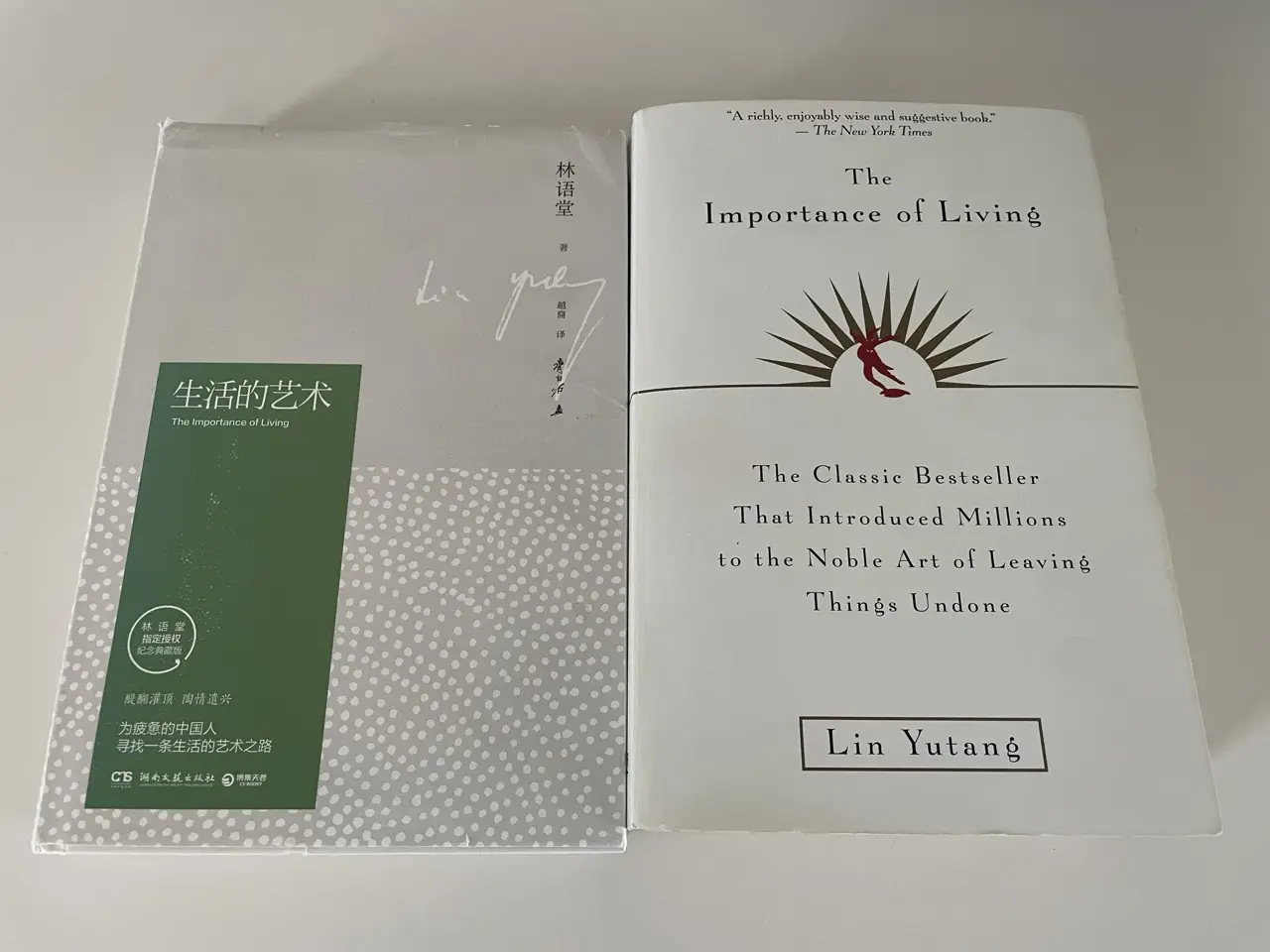Lin Yutang (林语堂, lín yǔtáng) was a prominent Chinese writer and thinker known for his ability to connect Eastern and Western ideas. Educated in both China and the West, Lin combined insights from Confucianism and Western philosophy in his work. His 1937 book, The Importance of Living (《生活的艺术》, shēnghuó de yìshù), emphasises enjoying life’s simple pleasures and finding a healthy balance between work and leisure. The book became popular in both China and the West for its practical wisdom and reflections on living a more content and meaningful life.

“It is a truism to say that the culture of any nation is the product of its mind”
“任何一个民族的文化都是他的思想产物”
Lin Yutang argues that Chinese thought is fundamentally different from Western philosophy, shaped by centuries of distinct cultural and historical experiences. Given that Chinese culture evolved largely independent of Western influence, it could offer fresh perspectives and methods to give answers to the problems of life.
“中国民族思想在种族性上和西方文化是那么不同,在历史上又和西方文化那么隔离着;因此,我们自然能从这种地方,找到一些人生问题的新答案,或者好一些,找到一些探讨人生问题的新方法。”
Lin notes that while China has brilliant artistic achievements, it lacks the kind of formalised, scholarly philosophy seen in the West. Chinese thought is practical, intuitive, and poetic rather than logical or scientific. Lin highlights the distinct value of this approach: unlike many cultures that may produce a few great philosophers, the Chinese worldview embodies philosophical thinking at a societal level. It is not about isolated intellectual figures but a general cultural tendency to observe life with wisdom and balance.
“For a nation to have a few philosophers is not so unusual, but for a nation to take things philosophically is terrific”
“一个民族产生过几个大哲学家没什么稀罕,但一个民族能以哲理的眼光去观察事物,那是难能可贵的。”
This difference, Lin suggests, is what has allowed Chinese civilisation to endure for over four thousand years. China is more philosophic than it is efficient. Otherwise, the nation would not have survived for such a long time with the high blood pressure of an efficient life.
“中国这个民族显然是比较富于哲理性,而少实效性,假如不是这样的话,一个民族经过了四千年专讲效率生活的高血压,那是早已不能继续生存了。四千年专重效能的生活能毁灭任何一个民族。”
“An important consequence is that, while in the West, the insane are so many that they are put in an asylum, in China the insane are so unusual that we worship them.”
“在西方狂人太多了,只好把他们关在疯人院里;而在中国狂人太罕有了,所以崇拜他们。”
Lin concludes that the Chinese approach to life is one of lightness, joy, and balanced wisdom. A philosophy that finds its truest expression in the everyday life.
“中国有一种轻逸的,一种近乎愉快的哲学”
Two character words
- 产物 chǎnwù
Product, result (of)
Example sentence: 任何一个民族的文化都是他的思想产物。 - 种族 zhǒngzú
Ethnicity
Example sentence: 中国民族思想在种族性上和西方文化是那么不同。 - 隔离 gélí
Isolated
Example sentence: 在历史上又和西方文化那么隔离着。 - 探讨 tàntǎo
Explore, discuss
Example sentence: 找到一些探讨人生问题的新方法。 - 稀罕 xīhan
Rare, uncommon
Example sentence: 一个民族产生过几个大哲学家没什么稀罕。 - 哲理 zhélǐ
Philosophical theory
Example sentence: 能以哲理的眼光去观察事物,那是难能可贵的。 - 可贵 kěguì
To be treasured
Example sentence: 能以哲理的眼光去观察事物,那是难能可贵的。 - 崇拜 chóngbài
To worship
Example sentence: 在中国狂人太罕有了,所以崇拜他们。 - 轻逸 qīngyì
Light, carefree
Example sentence: 中国有一种轻逸的,一种近乎愉快的哲学。
Three & Four character words
- 高血压 gāoxuèyā
High blood pressure
Example sentence: 四千年专讲效率生活的高血压。 - 民族思想 mínzú sīxiǎng
National thought
Example sentence: 中国民族思想在种族性上和西方文化是那么不同。
All the quotes and paraphrases come directly from the book The Importance of Living by Lin Yutang and 生活的艺术 by the same writer.